We recently announced that we’re working to streamline our product APIs with the goal of providing you with an intuitive and consistent API experience that helps you and your teams develop process automation solutions faster. This initiative includes introducing a REST API for Zeebe. One of the first changes we’re making is to shift user task state management from Tasklist to Zeebe in order to centralize entity management and provide a more cohesive user experience.
Our goal is for the Zeebe API to ultimately cover all aspects of process management, while data querying is supported by the Operate and Tasklist APIs. Eventually, all of that will be covered in a single Camunda 8 API. Zeebe will become the only component responsible for managing the state of user tasks. Along with this shift, we’ll update the Zeebe API with REST endpoints that are dedicated to user task management.
Until recently, user tasks weren’t built into Zeebe, and Tasklist had to handle the state of user tasks (meaning Zeebe didn’t know the task state until the task was completed). To overcome this limitation, we have introduced a new type of user task to Zeebe. Now, we support the following types:
- User task as job worker: The existing implementation, handled by the Tasklist component
- Zeebe user task implementation: A new approach with Zeebe handling user task management
To ease migration, the Tasklist UI will support both implementations seamlessly and simultaneously. The Tasklist API will continue to support management of user tasks based on job workers, while Zeebe will provide endpoints for Zeebe user task state modifications. You can use the Tasklist API to query both user task types. Read more about the differences between the two user task implementation types and how to migrate from job worker-based user tasks to Zeebe-based user tasks in the migration guide.

This is an intermediate state that will enable us to fully transition user task management to Zeebe. Eventually, we will deprecate the job-based user tasks and further develop Zeebe user tasks, including features known from Camunda 7 such as task listeners in addition to new functionality such as fine-grained task analytics.
Benefits of Managing User Tasks in Zeebe
By transitioning user task management entirely to Zeebe, the architecture becomes highly modular, granting developers extensive flexibility to build customized task applications according to their preferences. This includes the option to host the Tasklist Web App for enhanced query capabilities or to exclude it for a completely customized data layer.
In addition to these architectural improvements, you will benefit from a wide range of features when using Zeebe user tasks:
- A new API endpoint allows developers to update due dates and follow-up dates and to change candidate users and groups on the fly.
- Each operation, including create, assign, update, and complete, emits an auditable event.
- Developers can track custom actions in these events to realize use cases such as fine-grained audit logs, performance tracking, and domain-specific event-driven logic.
- The request and response objects have been significantly simplified (for example, through simple JSON bodies for variables) and follow RESTful practices.
What’s Next
As the next step, we’re working on task listeners that can help you react to task lifecycle changes. Stay tuned for more blog posts explaining the upcoming changes, and if you have any questions, visit us at the Camunda Forum.


Start the discussion at forum.camunda.io